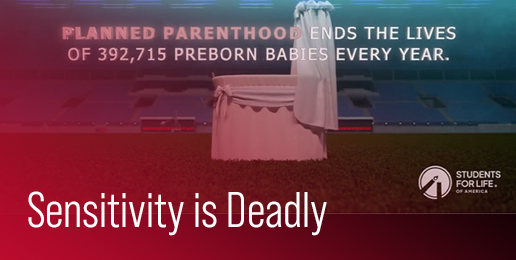
Students for Life, a prominent pro-life organization, recently produced an advertisement to be displayed on the national stage. However, the ad was shot down just before it got there.
According to Students for Life (SFL), this 30-second ad was supposed to air during the NFL football game on January 5th. The ad exposed the number of abortions that Planned Parenthood commits every year (almost 400,000), and it urged viewers to stop federal funding of abortions.
However, just a couple days before it was to air, the organization handling these ads (Reach TV) cancelled this ad.
As I hear from a secondary source, Reach TV apparently told Students for Life that the matter was “too sensitive.” Wait, too sensitive?
The ad’s main image is a cute little baby bed sitting in the middle of a sports stadium. A cute little lullaby song plays in the background, and a cute little baby voice can be heard making cute little baby sounds.
Now, the ad does contain some shocking stats—Planned Parenthood kills enough babies to fill six-and-a-half stadiums each year. And the ad actually calls abortion “violence,” so it isn’t completely wall-papering over the gravity of the topic.
But none of the images are graphic, and there are plenty of cuteness overtones running through the whole thing.
I mean, football fans literally cheer over grown men beating each other up for a living. You’re going to say that a cute little ad like that is “too sensitive?”
But yes, I know what Reach TV really means. The issue itself is too sensitive. The claim that six and a half athletic stadiums full of babies die every year is too sensitive.
So then I have a question for Reach TV: Is the claim false or is it true?
If it’s false, I want to know how you would debunk it, given that SFL is using publicly available information about abortion counts and amounts of federal funding.
But if it’s true that Planned Parenthood kills 392,715 babies every year, then don’t you think that should be addressed? Isn’t that a horrific abomination that people should know about and deal with, regardless of how sensitive you think it is?
Really, the issue here is not that abortion is too sensitive, it’s that Reach TV is too sensitive.
Honestly, I am sick and tired of people being too sensitive. It sure seems like the Greatest Commandment in today’s world is “thou shalt not hurt other people’s feelings.” Maybe it’s time we got a little less sensitive, Reach TV. Maybe it’s time we put our big-boy pants on and actually addressed the horrors of a sinful world.
Abortion is incredibly insensitive to the babies it dismembers with stainless steel clamps. Your sensitivity is blocking those who are trying to stop it.
But now let’s turn our focus toward the particulars of SFL’s ad. As strongly as I’ll criticize Reach TV for cancelling it, I actually have significant concerns about the ad itself.
Here’s the danger I see: this ad—and ads like it—should never become the DNA of the pro-life movement. Pro-life ads should be calling for an outright end to abortion and criminal penalties for both those who commit it and their accomplices.
Merely “ending federal funding” is a step towards that goal—and I pray the new administration takes it seriously—but it should never be the goal.
As soon as federal funding ceases, Lord willing, we should all wipe the sweat off our foreheads and keep pushing just as hard to complete the next step. Any victory celebrations for a small step like this should always be bittersweet, as we remember the blood that is still being shed with non-federal funding and we work no less hard to end that, too.
Now, I have no idea what kind of negotiations SFL had to engage in to convince Reach TV to even consider this ad—obviously, even the watered-down version they produced was “too sensitive.”
Thus, it’s probable that anything even more true-to-form would have been rejected even more quickly, and so SFL was trying their best to get the message out in whatever form was acceptable. Sometimes, getting any version of the truth out to millions of people is better than getting the full truth out to no one.
But even if we give SFL the benefit of the doubt, let’s make sure we all keep one thing straight: This kind of watered-down marketing should never become the rallying cry of the pro-life movement.
Pro-lifers, you should never watch an ad like this and think,
“Yes, that’s what I stand for: cute baby beds and no federal funding!”
You should see only the tiny tip of the iceberg-size magnitude of what you do believe:
“Abortion is murder and it should always be punished.”
Therefore, there’s actually a danger in relying too much on watered-down marketing like this. It teaches the nation—and ourselves as pro-lifers—that we support superficial goals for superficial reasons.
We value cute babies. We don’t think taxpayer funding should go to ending their lives. Those are both true and valid, but the more we tell doctored-up stories to the world, the more we’ll begin to believe that it is in fact what we are all about.
Abortion isn’t wrong because it isn’t cute. Abortion is wrong because it’s murder. Never forget that.
SFL’s ad reflects this somewhat—kudos to them for actually calling it “violence”—but it needs more.
Pro-life ads should call for outright abolition of abortion. They should call for criminal penalties for those who commit and assist in them. The ads should show graphic pictures of what abortion does to babies—the tiny, bloodied hands and feet of little innocent boys and girls ripped apart by vacuum machines and surgical tools.
The ads should take aim at the systematized institutions of mass murder we call abortion providers, comparing them to history’s worst dictators. The ads should ascribe the blood of those babies to the complacency of spineless churches that don’t do anything about it.
You get the picture.
All in all, I’m not going to say whether SFL should or shouldn’t have done their ad the way they did—I don’t know all the specifics and constraints of their situation. But I do know that ads like this should never become our rallying cry.
Watered-down ads like this one might be the only way to get a tiny bit of our message through to millions. But we can’t rely on them. We’ll just start teaching everyone—and ourselves—that we stand for a watered-down cause.























